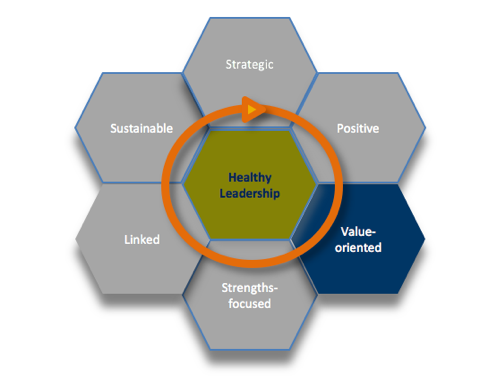Value-oriented leadership in the Healthy Organisation (4/7)
Value-oriented leadership is an important component in our concept of the Healthy Organisation. However, in day-to-day business life values often play merely a subordinate role. Companies often underestimate the relevance that values have for their employees. This usually has negative effects. Value-oriented leadership, thus, not only provokes that employees get fully involved with the company, but it fosters a positive economic development in the medium and long term.

Values are being understood differently in sciences as well as in everyday life. Reduced to two useable dimensions, values can be either understood in connection with a certain content (watch, car…) or they are related to something which is personally important to us (integrity, competency, fun etc). However, values often arise due to individual motive constellations, which in turn are characterized by the context, in which we grew up and live. One crux already becomes apparent when we talk about common values in organisations: values in organisations are defined at some point in time, possibly from the top down - which makes them supra-individual, predefined on the organisation level. Nevertheless, everybody shall conform with the values and act according to them. Often values play only a modest role in daily business life - maybe due to this dilemma - which unfortunately (!) seems to be important only to HR representatives.
If values are taken seriously, a balance between living values and accepting non-common values, between tolerance on the one hand and sanctioning on the other hand becomes significant.
Value-oriented leadership in our model of the Healthy Organisation (see illustration above) means influencing people on the basis of a common value understanding in such a way, that the achievement of worthwhile targets is enabled.
The bigger the overlap between the values of the individual and the values of the organisation, the deeper people can get involved with their organisation. On the other hand this means: the smaller the overlap, the bigger the probability for the emergence of conflicts. However, since values are context dependent, they are often more changeable than we tend to believe. Everyone of us is familiar with this: we meet other people, whether in a foreign culture or in our cosy circle of friends, and at first we are surprised by the values of these people. But when we get to know them better and learn to appreciate them it is quite possible that our values change as well, or at least assimilate. Sometimes even fundamentally. The same is true for organisations. Here as well we can be influenced by lived values, such that the correlation between personal and organisationalvalues in the end is bigger than before. Of course, the same holds true vice versa: If values are not being lived or are even treated with contempt, employees are ready to leave, which is often the best solution for both sides. Often enough, however, they are frustrated and see no way out. They stay and punish the company (less performance, absenteeism, badmouthing among friends and acquaintances or in social networks, up to theft or even sabotage). Thus, not living values implies a risk because one pretends something that does not reflect reality. Usually nobody appreciates this over a longer period of time and it can only be compensated by means of high expenses in other places (e.g. bonuses).
What can you do concretely, if you want to lead in a value-oriented way?
- - Define the values, that are especially important to you in a joint process. Involve as many people as possible, in order that an active value discussion can take place. In doing so consider the past, the present and the future - your employees will tell you, whether certain values really fit or rather not.
- - Write down the values in a binding way and make them public via your communication channels towards the inside and the outside.
- - Take care that the company values can be lived, by making them a basis of decision-making. Take care that you do not violate these values, even if it could bring youdisadvantages in the short run (e.g. by the loss of customers). In the long run, your action will pay off.
- - Integrate these values in your decision-making processes and your HR systems (e.g. employee surveys, performance reviews, performance measurement).
- - Act in compliance with your values und enter into a dialogue with your employees. Talk about their values, the differences and similarities.
- - Welcome diversity, but remain consistent regarding your canon of values. Sanction non-conform behavior where required - employees usually look very closely at how incorrect behavior is being treated.
- - Recruit employees not only with regard to their professional competence and their knowledge, but also based on the best possible “fit“ with your company values.

